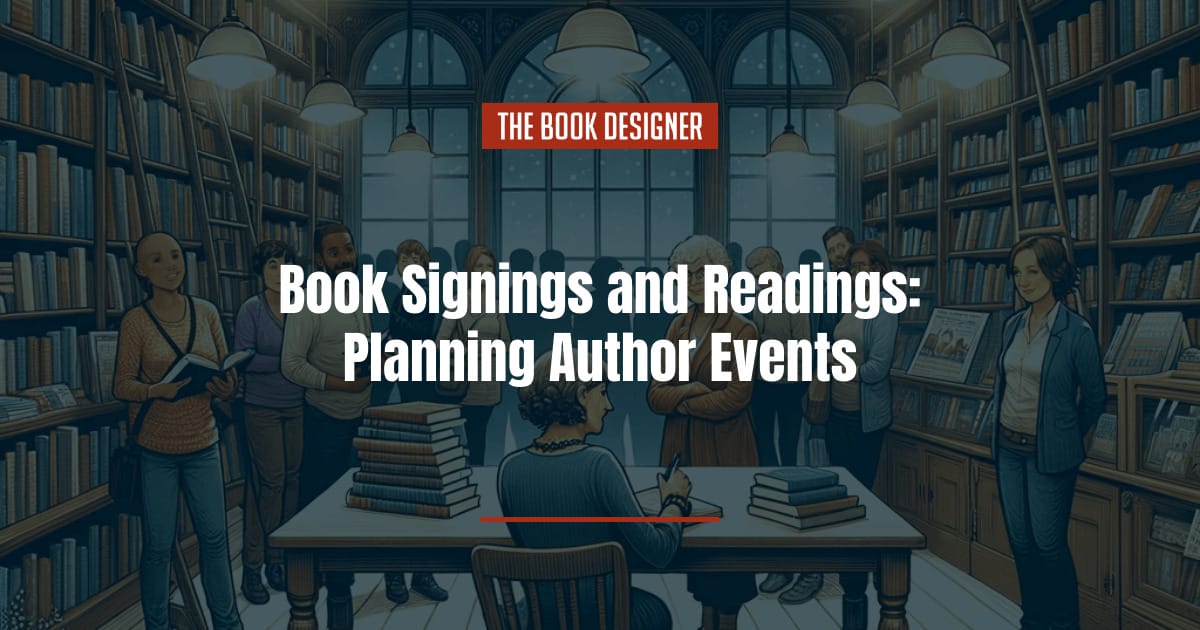As an author, you possess a special opportunity to engage directly with your audience. Events like book signings and readings are not just occasions to promote your latest work; they are also platforms where you can connect personally with your readers, share your journey, and discuss the intricacies of your writing.
These interactions are invaluable, as they not only strengthen your relationship with your audience but also provide you with direct feedback and insights into how your work is perceived and received. In this context, author events become more than just promotional tools; they transform into meaningful experiences that enrich both you and your readers.
Learn what to do when planning your book signing or other author event:
What Is an Author Event?

An author event is a gathering or occasion where an author interacts with readers, fans, or the general public. These events provide an opportunity for authors to discuss their work, share insights into their writing process, sign books, answer questions, and engage with their audience. In return, authors can build a dedicated fan base, receive direct feedback from their readers, and promote their work.
Many best-selling and successful authors have, at one point in their writing career, organized a book signing or other author event, including George R.R. Martin, Stephen King, and Joyce Carol Oates.
Author events can take various forms, including:
1. Book Signings
Often held in a public setting, a bookstore, or a book fair, a book signing is an event, where you, an author, autograph copies of your books. Readers can meet you in person during a book signing, hear you speak about your work, and give you their purchased copy to sign or write a message in.
2. Book Readings
In a book reading, you read out excerpts of your published work aloud to your audience. Held in bookstores or libraries, this event provides a unique opportunity for your readers to experience your writing style, tone, and narrative voice directly from you—creating an intimate experience that enables your readers to appreciate the nuances of your storytelling.
3. Q&A Sessions
Q&A sessions give you an interactive platform to engage with your readers. Usually a segment within an author event, Q&A sessions involve your readers asking you questions about your work, your characters, your plots, and the overarching lessons in your work. This allows them to gain insights into your writing process, draw inspiration from you, and learn the personal anecdotes that influenced parts of the events in your work.
4. Panel Discussions
Panel discussions, such as ComicCon events, entail a group of authors coming together to share their thoughts on a specific topic, genre, or theme. These events often feature a moderator who facilitates conversations and allows your audience to ask questions. During a panel discussion, readers and fans of your work get a deeper understanding of your perspectives, ideas, opinions, and diverse writing experiences.
5. Author Conferences
An author conference is a gathering of writers, authors, and literary professionals who engage in discussion and share knowledge about the world of literature. In addition to exploring the juxtaposition of culture and literature, author’s conferences often provide you with networking opportunities, professional development, recognitions, and literary awards, and an avenue to showcase your new works.
Why Book Signings and Other Events Are Important
Virtually every successful author out there, from Jodi Picoult to Margaret Atwood to Neil Gaiman, has done book signings and other author events at various points in their careers. They recognize the rare opportunity to connect directly with readers and further their author careers.
Here are five crucial reasons why authors’ events are important:
1. Author-Reader Connection
Meeting your readers in person allows you to listen to their reasons for liking your work, get feedback on how to make your writing better (or resonate more), and gain ideas on newer themes to explore in your work.
On the flip side, readers gain insights into what inspired you to write, ask you questions about past, present, and future works, and express their thoughts directly. This personal engagement creates a sense of loyalty and connection that goes beyond the written word of the page.
2. Book Promotion
Well-done book signings help generate excitement about a new release or an existing book among attendees. Your conversations with them can create a lasting impression, and encourage readers to buy the book and share their experiences with friends, family, and on social media.
If you’re organizing your event in a bookstore or library, you can forge strong relationships between booksellers and librarians, and encourage them to recommend your book to customers. And if your event gets media coverage in newspapers, magazines, blogs, television, or radio, that can significantly boost your book’s visibility and get more eyes on your work.
3. Author Visibility
When organizing a book signing or other event, you likely promote it via social media platforms, blogs, and other distribution channels. This promotion can reach people who have never heard of you before, increasing your visibility and popularity among young readers and authors alike.
Media coverage, interviews, and photos from these events also contribute to your public image, attracting new readers, and securing future deals and collaborations.
4. Building a Community
Author events bring together readers who share a common interest in your work. Attendees at these events often bond over the appreciation for your work, your writing styles, themes, or characters. This sense of community also extends to you, as they become your focal point for interactions and discussions.
5. Feedback and Insight
Author events, especially book signings and readings, offer insights into the curiosities and interests of your readers. At these events, you can gauge which themes resonate with your readers and gain a better understanding of your work from the questions that arise.
The feedback loop created at these events becomes a dynamic source of inspiration and guidance for you as you navigate future writing projects.
8 Things to Do When Planning a Book Signing
Planning your book signing or other author event is an exhilarating task that requires careful consideration and strategic thinking to succeed. Here are five things to do when planning your author event:
- Set goals: You need to have clear goals and objectives as to what you want to achieve with the event. This could be increasing book sales, building your author’s brand, fostering reader engagement, or something else entirely.
- Research your target audience: Knowing the demographics and interests of your target audience will help you tailor the event to their preferences. Consider factors such as age, reading preferences, and location, as this will affect the venue choice and the overall atmosphere of the event.
- Set a time and date: Pick an appropriate time and date that will maximize attendance. After considering your target audience and their likely availability, take into account major holidays such as workdays, local events, and holidays to avoid time clashes.
- Work with bookstores or vendors: Establish a partnership with bookstores or vendors to facilitate book sales during the event. Confirm that your book(s) is available in sufficient quantities and that attendees have convenient access to your work. Also, ensure that there are several payment methods and potential discounts to incentivize people and ensure smooth transactions.
- Prepare a program schedule: Create a detailed schedule outlining the flow of the event. Specify key segments such as introductions, your presentation, Q&A sessions, and book signings, allocate a specific time slot for each activity to prevent overruns, stick to your schedule, and strike a balance between engaging content and audience interactions.
- Create a comprehensive marketing plan: Combine both online and offline channels in your marketing strategy, including fliers, word-of-mouth marketing, social media platforms, and email newsletters. You can expand your reach by collaborating with libraries, bookstores, and relevant communities to promote your event. If possible, offer incentives or early bird promotions to boost your attendance.
- Plan engaging activities: Author events can get boring if attendees have to sit for hours and just listen to you talk about your work. To prevent boredom from pervading your event and ruining the atmosphere, include engaging activities to keep your audience awake and engaged. This can include games, a Q&A session, and even a food break. Allow time for networking and socializing. Ensure there’s a good flow and pace of the activities on the agenda, and be prepared to handle unforeseen circumstances on the day of the event.
- Logistics and technical requirements: Pay close attention to logistical details, including sitting arrangement, lighting, audio-visual equipment, and any technical requirement for the performance to ensure seamless flow of the event.
5 Best Practices for Preparing for Your Book Signing
While your book signing should be fun and engaging, it should also be professional the entire time. To ensure this, here are some best practices to keep in mind when preparing for your event:
- Be prompt: Be at the venue earlier than the other staff to familiarize yourself with the set-up and your audience. Not only does this show that you take the event seriously and you’re excited to be there, but it also ensures a seamless and successful experience for the stakeholders involved. However, hitches happen. If you’re going to be late, contact your publicist to notify your audience.
- Train your staff and volunteers: Your event staff and volunteers need to be courteous, efficient, and well-informed. You can either hire staff that have experience working at author events, or train new staff and volunteers on their roles and responsibilities during the event.
- Evaluate and learn: After the event, conduct a thorough evaluation to gauge what worked well and what could be improved upon. Use your observations and feedback from your attendees to refine your planning process and create better author events in the future.
- Accessibility: Ensure that your venue is accessible to your audience/readers, including those with disabilities. Provide ample information on parking, public transportation, and any other relevant details in your marketing material.
- Be thankful: Bookstore owners often play a crucial role in supporting and hosting these events. After the event, send a personalized thank-you note or a small gift to the bookstore owner. This gesture goes a long way in expressing gratitude and leaves possible impressions for future collaborations.
Create the Perfect Book Signing or Author Event
The key to crafting the perfect author event is adequate planning—from picking out the right bookstore and setting a suitable date to promoting the event and ensuring that there are enough books for attendees to buy. Author events aren’t just about selling books though; they’re also about connecting with your readers, building a community, and collecting feedback that’ll make your future work even better.




